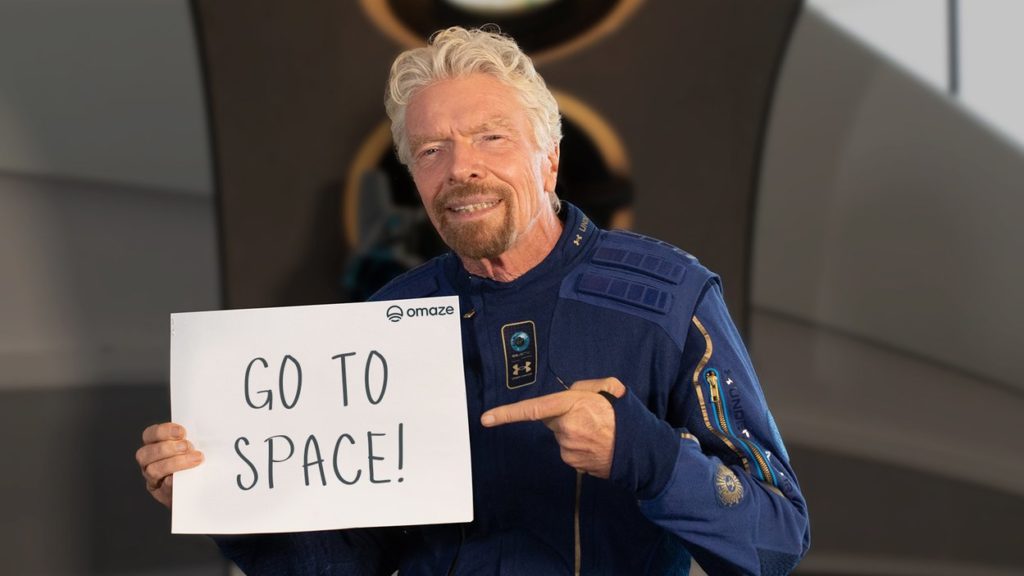
Guest blog post by Paul Jacobs
We are living in the midst of an amazing business cycle. Celebrity CEOs always seem to be in the news. Whether it’s Mark Zuckerberg, Bill Gates, or Jeff Bezos, business leaders are glorified. And TV shows like Shark Tank elevate the conversation about entrepreneurship.
In yesterday’s blog post, Fred talked about the bold steps Instagram CEO Adam Mosseri is taking to transform his social media platform. But all that pales in comparison to the feat pulled off over the weekend by Virgin head honcho, Sir Richard Branson.
As I watched him capture top honors in a brand new space race, it struck me the successful flight of Virgin’s Eve and Unity 22 completed the realization of Branson’s dream to create a commercial business in space. It was one thing to see the amazing 90-minute experience he and his crew experienced. But the truly impressive accomplishment was how this symbolized the culmination of a long, arduous 17-year journey.
How was it that a man who is fabulously wealthy and has a portfolio of successful companies had an itch that had to be scratched? It was so powerful it motivated him to risk billions of dollars on an enterprise with which he had no experience, but ultimately could revolutionize the future. Branson went where no CEO has gone before – and he did it one week before his 71st birthday.
It’s important to understand Virgin Galactic’s history and long, winding trail of misfires and tragedy, coupled with doggedness and unwavering belief. Branson’s saga contains important lessons for other industries – including radio.
You can watch a short summary of the mission here:
Crowd-sourcing – According to a great article in Space.com by Elizabeth Howell, Virgin Galactic was registered as a company way back in 1999, but really didn’t get started until 2004. A few years earlier, another company had created the Ansari X Prize – a $10 million competition to find someone who could invent a reusable spacecraft that could be used multiple times.
After the X Prize was awarded to a company funded by Microsoft’s Paul Allen, Branson was smart enough to partner with the X Prize’s founder to literally get Virgin Galactic off the ground. It took a crowd-sourced effort to write chapter one in this amazing story.
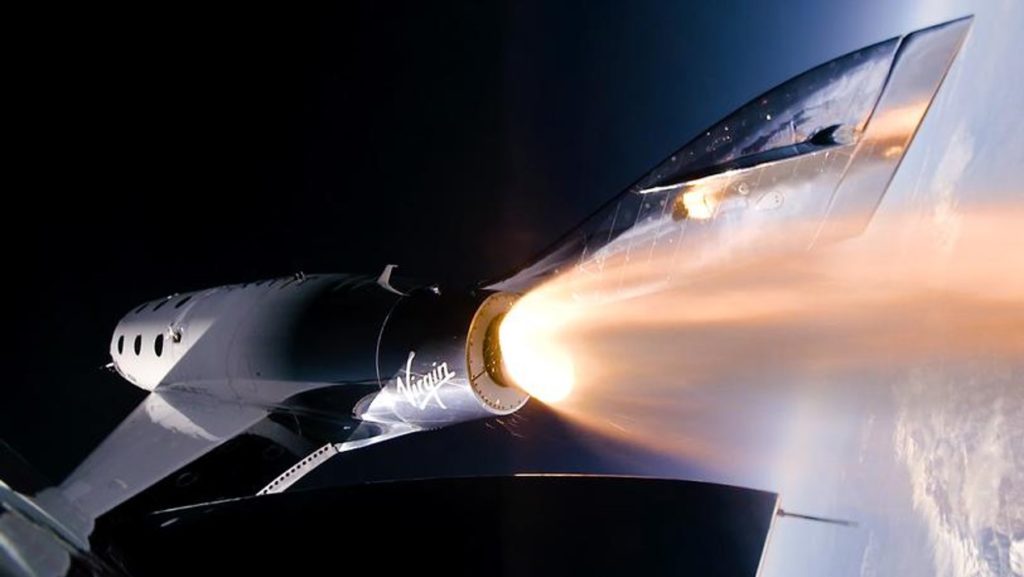
Bucking the odds (and the experts) – Virgin Galactic suffered numerous failures, none of which tamped down Branson’s enthusiasm for the project. In 2007 (the original year he expected to fly into space), an explosion during a test killed three workers; a second explosion in 2014 took the life of another.
Many in the press and in the traditional space community scoffed at Branson’s attempt, criticizing him “for prematurely rushing its relatively unproven technologies into use for publicity’s sake.” Another prediction: “Eventually they’ll crash one. Because it’s hard. They’re discovering how hard.” Not to be deterred or dejected, Branson and his team soldiered on.
Sharing the dream – While flying in space was a dream of Branson’s since he was a child (who hasn’t had that dream?), he was a smart enough marketer to share it with the world. Despite all of the delays and problems, he constantly talked about creating something that every person could participate in – that wouldn’t require decades of training to become an astronaut for NASA or other space agencies. On virtually every media outlet imaginable yesterday, Sir Richard talked about how anyone could now experience space travel as he did on Sunday.
Admittedly, the $250,000 price tag for an admission ticket makes it impossible for most of us to participate, but we also know this price will steadily decline as Virgin Galactic (and possibly Jeff Bezos’ Blue Origin) open up the experience to more people, including someone like you or me with the urge to spend a few minutes at zero gravity.
And attention radio program directors: Showman that he is, Branson has launched a “win-it-before-you-can-buy-it” contest.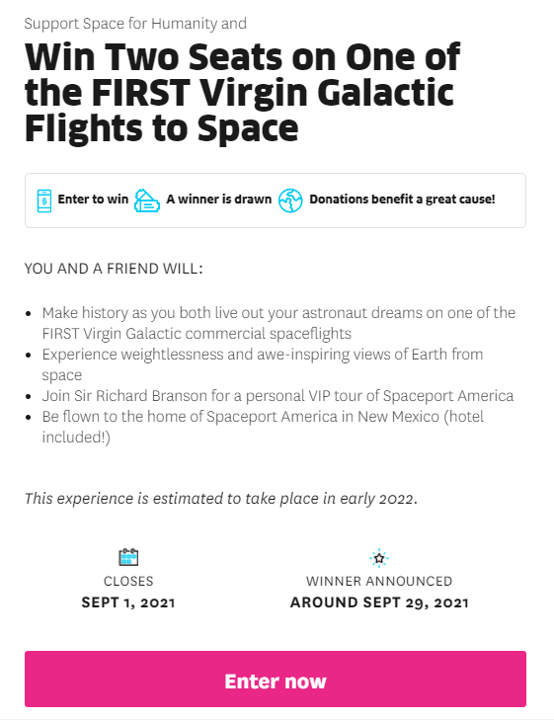
Virgin Galactic is giving away a trip to space – and you don’t even have to be the 9th caller. It’s cooler than seeing the Foo Fighters at Wembley Stadium.
Looking at the rules (right), it’s a reminder of the power of great marketing, and of course, thinking big. Apparently you don’t need to be present to win.
Hopefully, Sir Richard ran everything by Virgin legal.
The perfect elixir: celebrity + an event – Like any great broadcaster, Branson understood that in order to capture the imagination of the masses, this needed to be more than a 90-minute space flight. It required a story (his), a celebrity (him), and a made-for-TV event.
Similar to how Elon Musk has brought all of us into to cockpit of his SpaceX exploits, Branson owned all of the TV networks for several hours. And the event’s worldwide livestream was hosted by Stephen Colbert.
An eye on the prize – The other unspoken element of Branson’s success is something so completely counter to our culture and business practices that it must be noted: patience.
Imagine if Branson worked for a radio company, and 17 years ago talked about a new format he believed in that had never been done before. Naturally, the company would want to research the concept, but as we know, it’s virtually impossible to test something that doesn’t exist. It would require losing billions of dollars along the way and bringing in a diverse set of investors to keep it afloat. There would be many scary moments (think of bad rating books) and a lot of sideline jibes about the concept being far-fetched.
How many companies would have the audacity and the courage to stay with a project like Virgin Galactic for 17 years?
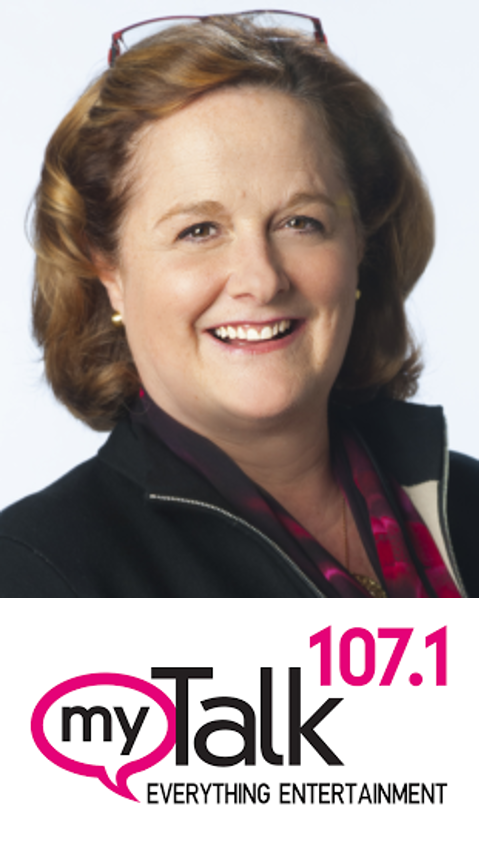 In radio world, the only analogy I can think of is Hubbard Radio’s “folly” in their home market of Minneapolis/St. Paul – myTalk 107.1. The dream of CEO Ginny Morris, the station was far from an overnight success. It launched way back in 2002 as an all-female talk station. At the time, talk radio in the U.S. was a very guy-oriented enterprise led by Rush Limbaugh (who coined the term “femanazis”). And radio targeted to women were versions of Celine Dion ACs or Boy Bands on CHRs.
In radio world, the only analogy I can think of is Hubbard Radio’s “folly” in their home market of Minneapolis/St. Paul – myTalk 107.1. The dream of CEO Ginny Morris, the station was far from an overnight success. It launched way back in 2002 as an all-female talk station. At the time, talk radio in the U.S. was a very guy-oriented enterprise led by Rush Limbaugh (who coined the term “femanazis”). And radio targeted to women were versions of Celine Dion ACs or Boy Bands on CHRs.
A 2015 article in the Minnesota Post noted it took quite a while for the station to turn a profit. Morris stuck with it, and remained a steadfast believer. As she said, “We wanted to do something that nobody else would copy.”
Morris and her Hubbard Radio team went through a number of iterations along the way, suffering weak ratings, and likely research reports that questioned myTalk’s sanity. But like Branson, that dogged belief has led My Talk 107.1 into solid profitability, and more importantly, a position they own that isn’t like to be challenged. Like Virgin Galactic, they were the first.
Market Manager Dan Seeman noted in Radio Ink back in 2017: “There is no other radio company in America that would have had the vision and the patience for myTalk 107.1. Today, myTalk 107.1 is woven into the lives of women in the Twin Cities. myTalk 107.1 listeners are some of the most passionate radio listeners in the market.”
And perhaps Ginny Morris might inspire Sir Richard on the most dangerous mission of them all – securing an American radio station for his Virgin Radio group.
Over the years, Branson has shown an impressive dedication to broadcast radio. His Virgin Radio group now numbers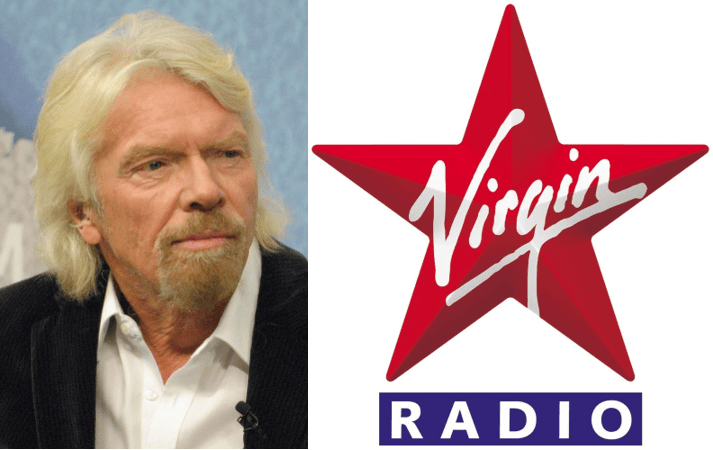 more than 40 stations strong.
more than 40 stations strong.
You can hear them in Canada, Italy, France, Lebanon, Turkey, Romania, the United Arab Emirates, Mumbai, Bangalore, Oman, Switzerland, and of course, the UK.
But not in the U.S.
You’d think that if Sir Richard has the persistence, vision, tenacity, patience, and the deep pockets to have launched Virgin Galactic, he’ll be in it to win here in America.
Will Branson’s next mission be to conquer the final frontier – American radio?
By the way, Virgin Radio’s slogan?
Changing radio for good.
You get the feeling Branson loves radio as much as he does space travel, making numerous appearances at his stations, posing with personalities and other staffers.
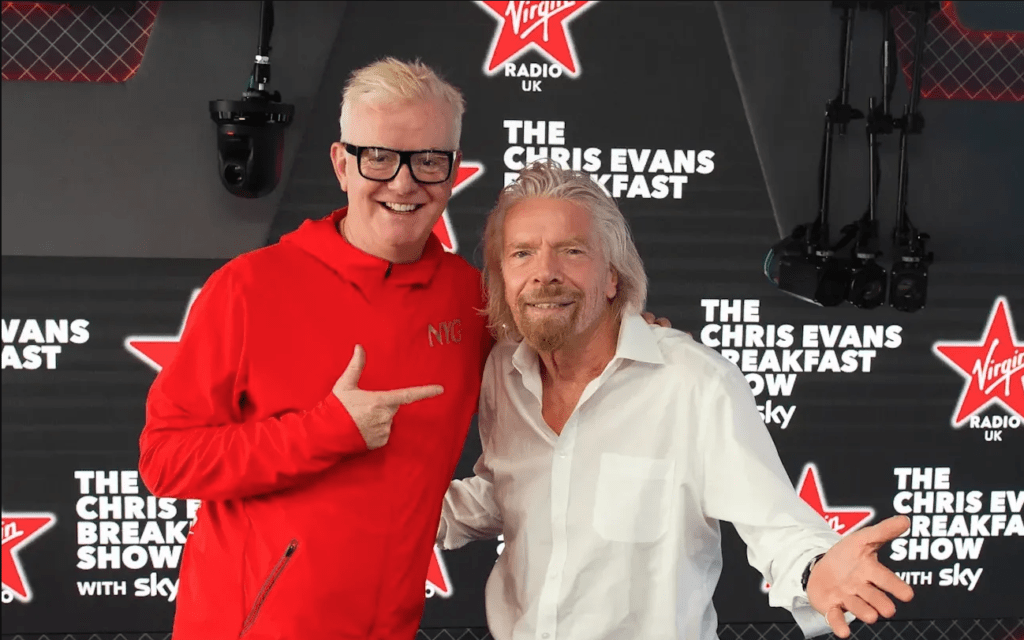
Ginny Morris can consult him on what starting a radio station in U.S. “space” is like.
Live long and prosper.
- For Radio, Will It Be Christmas In April (And Hopefully, May)? - April 21, 2025
- The Revolution Will Not Be Monetized - December 30, 2024
- What Kind Of Team Do You Want To Be? - October 4, 2024




I can tell you first hand from launching the first Virgin station in Canada and then rolling them out across the country that using the Virgin brand is INSTANT credibility, especially if there’s already a Virgin Mobile in the market. And now with Galactic….no brainer. Your station gets under that umbrella of greatness, larger than life, gambler, and and expectation of doing something great. People love the brand, trust it, Branson himself will come to the launch and beyond and do any crazy promotion or contest you can think up (he IS a showman), and even hang with the staff for hours and hours. He’s a really nice guy. Want to take your invisible station into the light instantly? License the Virgin brand. ***That’s what we did, licence the name. We built the stations our way but they’re more than qualified to help ‘consult’ etc. to help you build it.
Thanks for this background info about Virgin Radio and the great story about Branson. He’s not only a visionary, he’s an outstanding marketer. He gets it, and the results speak for themselves.
It’s probably only a matter of time before there’s a Virgin Radio station in the States.
This is a telling comment, Pat. And your endorsement goes a long way for me given the amazing brands in your career portfolio. Everybody’s a brand, from Michael Jordan to Donald Trump. But it’s interesting to me that Branson actually involves himself and his organization. Appreciate it.
Do it, Sir Richard! If Stephen King can do it here in Maine (3 Bangor stations), so can you.
Exactly, John.
Branson is not an American citizen. the FCC won’t allow him to own stations here.
He can’t own a station here (currently), but Branson can license the Virgin brand (which IS the asset) to any U.S. owner.